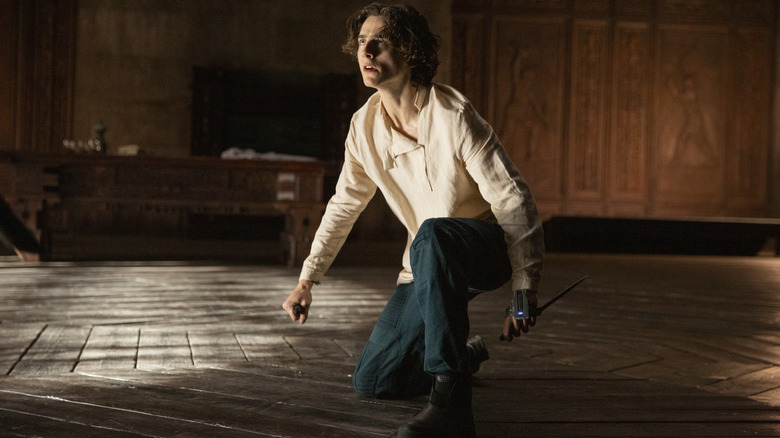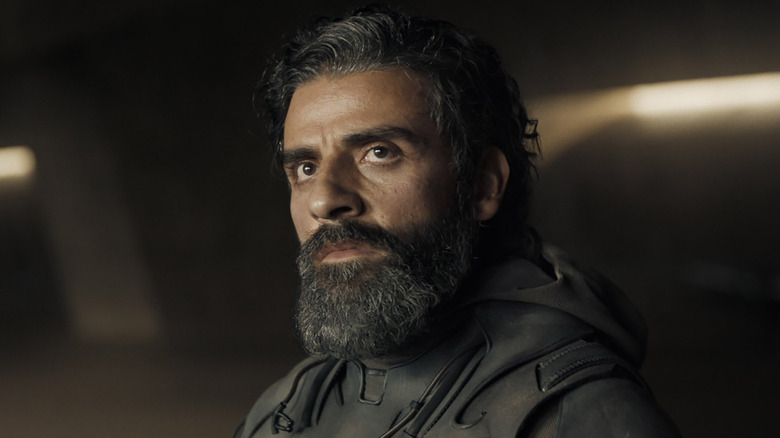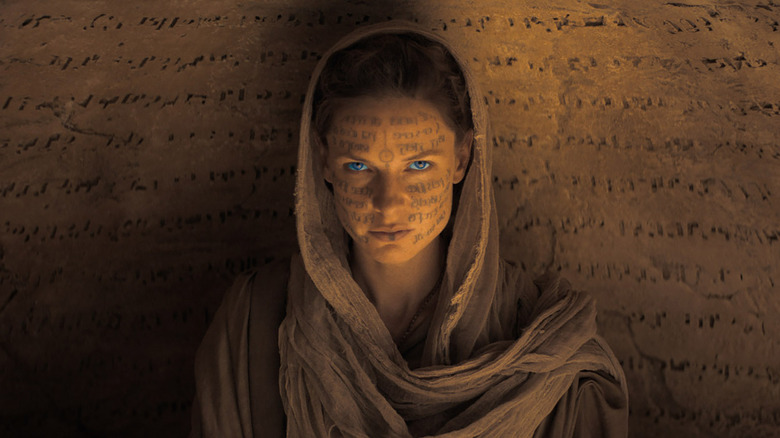Dune Proves That A Faithful Adaptation Doesn't Always Make A Great Movie
"They have tried to take the life of my son!"
These are the words angrily spoken and repeatedly brooded over by the Duke Leto Atreides at a pivotal moment relatively early on in author Frank Herbert's "Dune." Paul, Leto's son and heir, has just narrowly survived an assassination attempt by a poison-tipped "Hunter-Seeker" drone, mere days after relocating to the unforgiving and dangerous desert world of Arrakis. From a narrative point of view, this shocking event accomplishes a few key goals: it exposes the hubris and overconfidence of the Atreides clan, particularly the shortcomings of the Duke's trusted (but elderly) lieutenant Thufir Hawat; puts Paul's developing abilities and almost superhuman training to the utmost test, with his survival further adding to the crushing weight of destiny that rests on the young boy's shoulders; and drives home the threat of their Harkonnen enemies, who will seemingly stop at nothing to undermine the Duke.
With the exception of a few minor deviations for the sake of a more cinematic experience, this entire sequence of events is recreated beat-by-beat in Denis Villeneuve's adaptation of "Dune." Oscar Isaac's Leto even voices that exact line of dialogue above, hinting at his inner thoughts in the book that viewers are simply not privy to in the movie. And yet, despite such fealty to the source material, this scene was the first of many in the film to give me pause. Despite the life-or-death stakes, it comes and goes in the blink of an eye without ever fully registering with the characters or us viewers. It's a blip on the radar, a "Well, that happened" moment which is barely addressed or dealt with again.
The problem here is one that has plagued countless adaptations before: too much material to get through and not nearly enough time to do so. But it feels particularly disappointing for a story that demands as much of an epic, sweeping scope as "Dune" does. Worse still, this isn't an isolated incident. Too often, Villeneuve rips specific sequences straight out of the pages of the novel ... only to shortchange them in the scramble to get to the next one. Though many will undoubtedly disagree, we're left with what seems like a paradox — a case where remaining stubbornly faithful to the letter of the text leads to an adaptation that misses the spirit of the book precisely where it matters most.
Judge of the Change
In a striking difference from Herbert's "Dune," Villeneuve begins his story with the Harkonnens still ruling over Arrakis, though told from the perspective of the victims. Zendaya's Chani narrates the exploitation of the planet's natural resources, the brutalization of her Fremen people, and the abrupt change in stewardship ordered by the Emperor. The prologue ends with the lingering question of why this is happening and who will oppress them next before cutting to the main title and, suggestively, Paul Atreides (Timothée Chalomet) experiencing his dream-visions. These early moments set on Caladan with the Duke accepting formal authority over his new desert planet, Paul and Lady Jessica's (Rebecca Ferguson) foreshadowing display of "The Voice," and Paul's quiet conversation with his father about the burden of leadership are all invented for the film ... and these changes are the most effective scenes in the entirety of "Dune," by far.
Most of the sequences that follow, however, are lifted directly from the novel and don't fare nearly as well in that regard. Other than Paul's "Gom Jabbar" test held by Reverend Mother Gaius Helen Mohiam (Charlotte Rampling), Villeneuve betrays a perplexing need to include scenes that he subsequently renders immaterial to this specific version of the story he chooses to tell. Instances such as Lady Jessica's interaction with the crysknife-wielding housekeeper Shadout Mapes (Golda Rosheuvel) on Arrakis, Paul's aforementioned assassination attempt, the half-baked characters of Liet Kynes (Sharon Duncan-Brewster) and Dr. Wellington Yueh (Chen Chang), and the sandworm attack on the spice harvester are (mostly) well-constructed in and of themselves, yet amount to very little in the grand scheme of things. Their inclusion makes sense in Herbert's novel, combining to add layers of world-building and complexity and tension to the mix, but are so watered down in the film that they no longer serve those purposes anymore. It's damning that all could've been excised completely, allowing precious screen time to be allocated more wisely elsewhere (such as, say, key character-building moments that were apparently left on the cutting room floor).
Once again, Villeneuve's "Dune" follows Herbert's general outline as faithfully as possible. However, this rigidity in painstakingly recreating scattered moments and minor characters from the novel — regardless of narrative importance — comes at too high a cost. If only the rest of "Dune" felt as confident to mix things up as it did in its first act.
'I Thought We'd Have More Time'
The runtime of "Dune" officially clocks in at 2 hours and 35 minutes, yet it's shocking how it almost feels like half that. Variations of this remark have been widely used to compliment its pacing and engrossing plot, but in this case I don't mean it that way at all. Too often, "Dune" plays like a "Greatest Hits" collection that's on permanent fast-forward, hitting the important beats from the novel but without giving any individual one much time to breathe. It's an adaptation-specific consequence that Leto himself indirectly sums up, telling Lady Jessica (in practically the only conversation the two ever share) that he "thought we'd have more time."
The very foundation of the story — the Harkonnens losing control of the planet and its valuable spice, ceding Arrakis to House Atreides, and subsequently making a bold power play to reacquire their prize once more — demands that form follow function. For any of this to land in a filmed adaptation, in other words, we need to really experience it right alongside the Atreides family as they knowingly walk into the jaws of the trap on Arrakis, put down roots, make well-intentioned mistakes, and ultimately pay the price in tragic but inevitable fashion. These are all basic elements that Herbert handles extraordinarily well in the novel. He steadily builds up the fall of House Atreides as a monumental defeat and a devastating setback on both a micro level (through the betrayal, death, or capture of key supporting characters we've gotten to know and love) and the macro (the reinstitution of Harkonnen rule on Arrakis and the forced exile of the few Atreides survivors).
The film, on the other hand, jumps from Paul's assassination attempt to the sandworm set piece to the defeat of House Atreides, all with little to no context of how one builds upon the last. It's missing the vital connective tissue tying these major events together, which gives the impression that the Duke brings his entire force to Arrakis and finds himself completely overthrown in the span of ... a single weekend, give or take a few days? As a result, the Duke's death, Paul and his mother's exile, and their climactic acceptance among the Fremen can't help but seem painfully rushed. Such reverence for only the most obvious aspects of the novel makes this self-styled epic feel disproportionately small.
Meaning vs. Lore
Every story comes with certain inherent, non-negotiable qualities that need to be preserved at all costs in any adaptation. With "The Lord of the Rings," it stood to reason that Peter Jackson's trilogy would boast epic battles and otherworldly creatures, memorable characters, and the idealized form of fantasy morals that J.R.R. Tolkien helped popularize in the first place. Similarly, "Game of Thrones" at its best brought George R.R. Martin's darker, more cynical outlook to life while still keeping an eye on the war to come with the White Walkers. Along the same lines, one would imagine that the main draw of a film based on Frank Herbert's "Dune" would be its singular focus on politics, religion, philosophy, nature, and all the ways these elements intersect with one another in a self-critical hero's journey. At the heart of my concerns with Villeneuve's film, ultimately, is the complaint that almost all of this is missing from the actual film.
In place of any semblance of the novel's core facets, viewers instead get a barrage of mostly unexplained terminology that washes over audiences while lighting up that rote, "Hey, I vaguely remember reading that before!" pleasure center in the brains of readers. Now, this isn't to say that I needed an in-universe acknowledgement of those floating "glowglobes," a movie-stopping exposition dump on Thufir Hawat's (Stephen McKinley Henderson) "Mentat" capabilities as essentially a living computer, or a fresh glossary of "Dune"-specific terms to immediately consult every time a character referenced something unfamiliar. But based on the movie alone, can anyone really say they have a firm grasp on what the deal is with the bloodline-obsessed Bene Gesserit, or the nature of Paul's foreboding visions and his supposed status as the "Kwisatz Haderach," or why exactly the Emperor and Stellan Skarsgård's Baron Vladimir Harkonnen are so threatened by House Atreides in the first place? These aren't just idle questions, but fundamental details that ought to have been made abundantly clear from the outset.
If I were to take a page out of Frank Herbert's novel and turn any remaining subtext into text, I would say that "Dune" is largely a collection of disconnected moments and an overly literal, weightless journey without symbols or meaning. It's a frustrating outcome for any adaptation of such a rich text; one that misses the forest for the trees ... or the spice for the sand.



